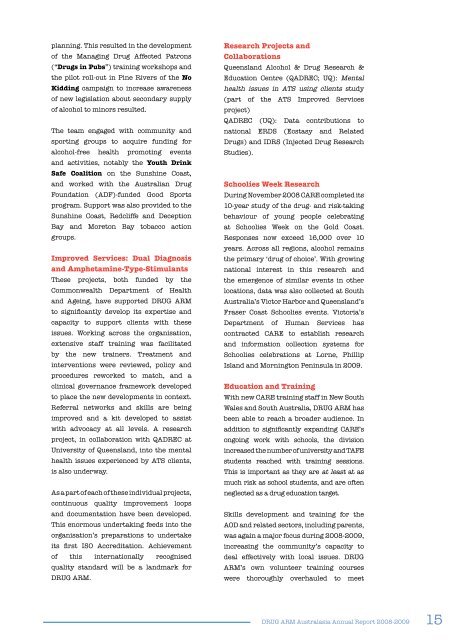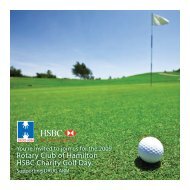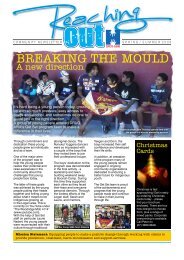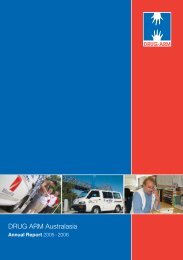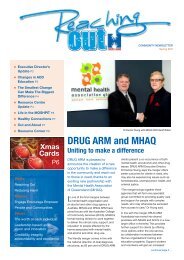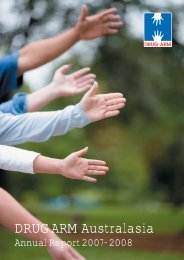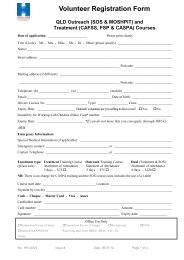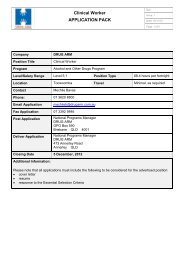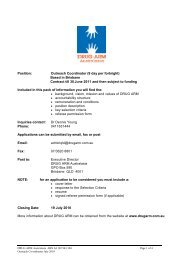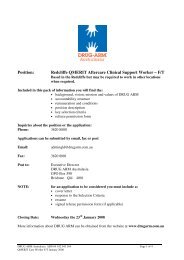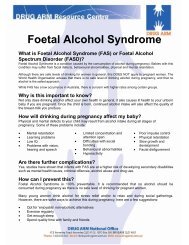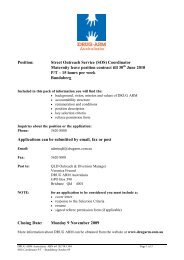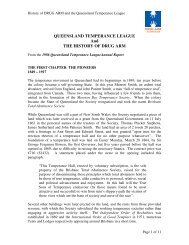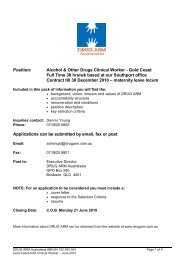DRUG ARM Australasia Annual Report 2008-2009
DRUG ARM Australasia Annual Report 2008-2009
DRUG ARM Australasia Annual Report 2008-2009
Create successful ePaper yourself
Turn your PDF publications into a flip-book with our unique Google optimized e-Paper software.
planning. This resulted in the development<br />
of the Managing Drug Affected Patrons<br />
(“Drugs in Pubs”) training workshops and<br />
the pilot roll-out in Pine Rivers of the No<br />
Kidding campaign to increase awareness<br />
of new legislation about secondary supply<br />
of alcohol to minors resulted.<br />
The team engaged with community and<br />
sporting groups to acquire funding for<br />
alcohol-free health promoting events<br />
and activities, notably the Youth Drink<br />
Safe Coalition on the Sunshine Coast,<br />
and worked with the Australian Drug<br />
Foundation (ADF)-funded Good Sports<br />
program. Support was also provided to the<br />
Sunshine Coast, Redcliffe and Deception<br />
Bay and Moreton Bay tobacco action<br />
groups.<br />
Improved Services: Dual Diagnosis<br />
and Amphetamine-Type-Stimulants<br />
These projects, both funded by the<br />
Commonwealth Department of Health<br />
and Ageing, have supported <strong>DRUG</strong> <strong>ARM</strong><br />
to significantly develop its expertise and<br />
capacity to support clients with these<br />
issues. Working across the organisation,<br />
extensive staff training was facilitated<br />
by the new trainers. Treatment and<br />
interventions were reviewed, policy and<br />
procedures reworked to match, and a<br />
clinical governance framework developed<br />
to place the new developments in context.<br />
Referral networks and skills are being<br />
improved and a kit developed to assist<br />
with advocacy at all levels. A research<br />
project, in collaboration with QADREC at<br />
University of Queensland, into the mental<br />
health issues experienced by ATS clients,<br />
is also underway.<br />
As a part of each of these individual projects,<br />
continuous quality improvement loops<br />
and documentation have been developed.<br />
This enormous undertaking feeds into the<br />
organisation’s preparations to undertake<br />
HIGHLIGHTS<br />
its first ISO Accreditation. Achievement<br />
of this internationally recognised<br />
quality standard will be a landmark for<br />
<strong>DRUG</strong> <strong>ARM</strong>.<br />
Research Projects and<br />
Collaborations<br />
Queensland Alcohol & Drug Research &<br />
Education Centre (QADREC; UQ): Mental<br />
health issues in ATS using clients study<br />
(part of the ATS Improved Services<br />
project)<br />
QADREC (UQ): Data contributions to<br />
national ERDS (Ecstasy and Related<br />
Drugs) and IDRS (Injected Drug Research<br />
Studies).<br />
Schoolies Week Research<br />
During November <strong>2008</strong> CARE completed its<br />
10-year study of the drug- and risk-taking<br />
behaviour of young people celebrating<br />
at Schoolies Week on the Gold Coast.<br />
Responses now exceed 16,000 over 10<br />
years. Across all regions, alcohol remains<br />
the primary ‘drug of choice’. With growing<br />
national interest in this research and<br />
the emergence of similar events in other<br />
locations, data was also collected at South<br />
Australia’s Victor Harbor and Queensland’s<br />
Fraser Coast Schoolies events. Victoria’s<br />
Department of Human Services has<br />
contracted CARE to establish research<br />
and information collection systems for<br />
Schoolies celebrations at Lorne, Phillip<br />
Island and Mornington Peninsula in <strong>2009</strong>.<br />
Education and Training<br />
With new CARE training staff in New South<br />
Wales and South Australia, <strong>DRUG</strong> <strong>ARM</strong> has<br />
been able to reach a broader audience. In<br />
addition to significantly expanding CARE’s<br />
ongoing work with schools, the division<br />
increased the number of university and TAFE<br />
students reached with training sessions.<br />
This is important as they are at least at as<br />
much risk as school students, and are often<br />
neglected as a drug education target.<br />
Skills development and training for the<br />
AOD and related sectors, including parents,<br />
was again a major focus during <strong>2008</strong>-<strong>2009</strong>,<br />
increasing the community’s capacity to<br />
deal effectively with local issues. <strong>DRUG</strong><br />
<strong>ARM</strong>’s own volunteer training courses<br />
were thoroughly overhauled to meet<br />
Drug Arm <strong>Australasia</strong> <strong>Annual</strong> <strong>Report</strong> <strong>2008</strong>-<strong>2009</strong><br />
15


